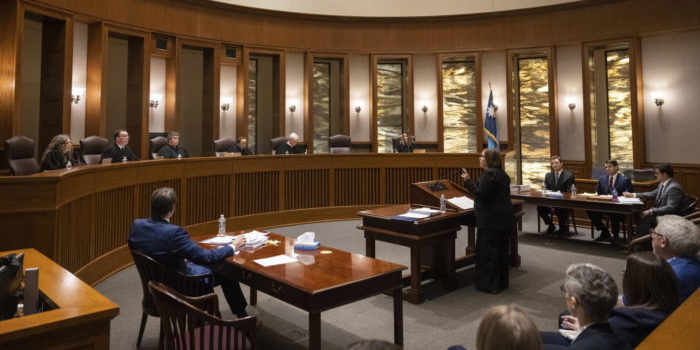(Headline USA) The Minnesota Supreme Court heard arguments Thursday on how deeply it should intervene in a power struggle between Democrats and Republicans over who should control the state House of Representatives.
Democratic representatives have stayed away from the state capitol since the 2025 legislative session opened Jan. 14 in an effort to prevent the House from getting the quorum that it needs to conduct normal business.
Republicans, who hold a temporary one-seat majority, say they already have a quorum and have pressed forward with electing their top leader as speaker, introducing legislation and holding hearings.
Democrats contend those are sham actions that have no legal force. Instead, it hopes the state Supreme Court—where all the justices were appointed by Democrats—will step in to assert itself as an impartial arbitrator.
The main dispute before the state’s highest court is whether a quorum in the House is 68 members as Democrats contend because there are 134 seats, or 67, as Republicans argue, because one seat is open.
The state constitution says a “majority of each house constitutes a quorum to transact business.” But lawyers for both sides pointed Thursday to various passages in the state and federal constitutions, statutes, case law and rules in Congress and other states to show that it’s not necessarily a simple question.
Chief Justice Natalie Hudson told Solicitor General Liz Kramer, who represented Democratic Secretary of State Steve Simon, that it seemed to her like the Democrats’ reading of the quorum language in the state constitution “is certainly a reasonable one. It’s a plain-language, straight sort of statutory interpretation.”
But she added that it also seemed to her that the GOP position “is at least equally reasonable.”
Nicholas Nelson, an attorney for House GOP leaders, argued that the court does not have the authority under the constitutional separation of powers to review how the Legislature organizes itself or its leadership choices. That’s the Legislature’s prerogative, he said, so the Democrats should not be allowed to use the court’s authority “to address an alleged quorum problem that is of their own making.”
Hudson responded that while the courts are rightfully hesitant to dabble in the business of another branch of government, there are also times when the courts are required to intervene.
“What we have is a co-equal branch of government that is completely dysfunctional, that is not doing the will and the work of the people of Minnesota,” she said. “Isn’t that an instance where, if not the judicial branch, who? Who steps in to resolve that?”
The justices took the case under advisement. Hudson said they would rule “in due course” without specifying when.
The November election resulted in a 67-67 tie in the House. A power-sharing agreement between the chamber’s top Democratic and Republican leaders fell apart after a Ramsey County judge ruled that the Democratic winner of a Roseville-area seat didn’t really live in his district and was ineligible. So the session started with a 67-66 GOP majority pending a special election to fill that seat—now expected in mid-March—which is likely to restore the tie because it’s a heavily Democratic district.
House Democrats say they won’t return until Republicans agree to a power-sharing deal and promise not to refuse to seat Democratic Rep. Brad Tabke, of Shakopee, who won reelection by just 14 votes in a swing district where the GOP would stand a good chance of winning a low-turnout special election. Republicans have refused to give that assurance, even though a Scott County judge declared Tabke the legal winner. Denying Tabke his seat would lock in the GOP majority until it could be filled.
While the standoff is unusual for Minnesota, lawmakers have blocked quorums many times in other states, even going into hiding to prevent state troopers or sergeants-at-arms from dragging members back to ensure they are present to conduct business.
Texas Democrats were celebrated by the mainstream media for their “civil disobedience” in preventing the state legislature from passing an election-integrity law in 2021, but they eventually were rounded up and forced to return.
In Oregon, Republicans boycotted the legislature in 2023, forestalling several key laws from the radical leftist lawmakers. They were later punished by the state Supreme Court, which ruled that they could not seek reelection as a result of the stunt.
As for the current Minnesota standoff, the fear of being hauled in has subsided a bit among House Democrats, who argue that their chamber is not legally organized yet and that Republicans therefore don’t have the legal authority to order the sergeant-at-arms to round them up. They say they’re hard at work in the meantime, meeting with constituents and local officials in their districts until the dispute gets settled.
By contrast, the Minnesota Senate, which is tied 33-33, is operating smoothy under a power-sharing agreement pending a Jan. 28 special election to fill the seat of a senator from a heavily Democratic district who died in December.
Adapted from reporting by the Associated Press

